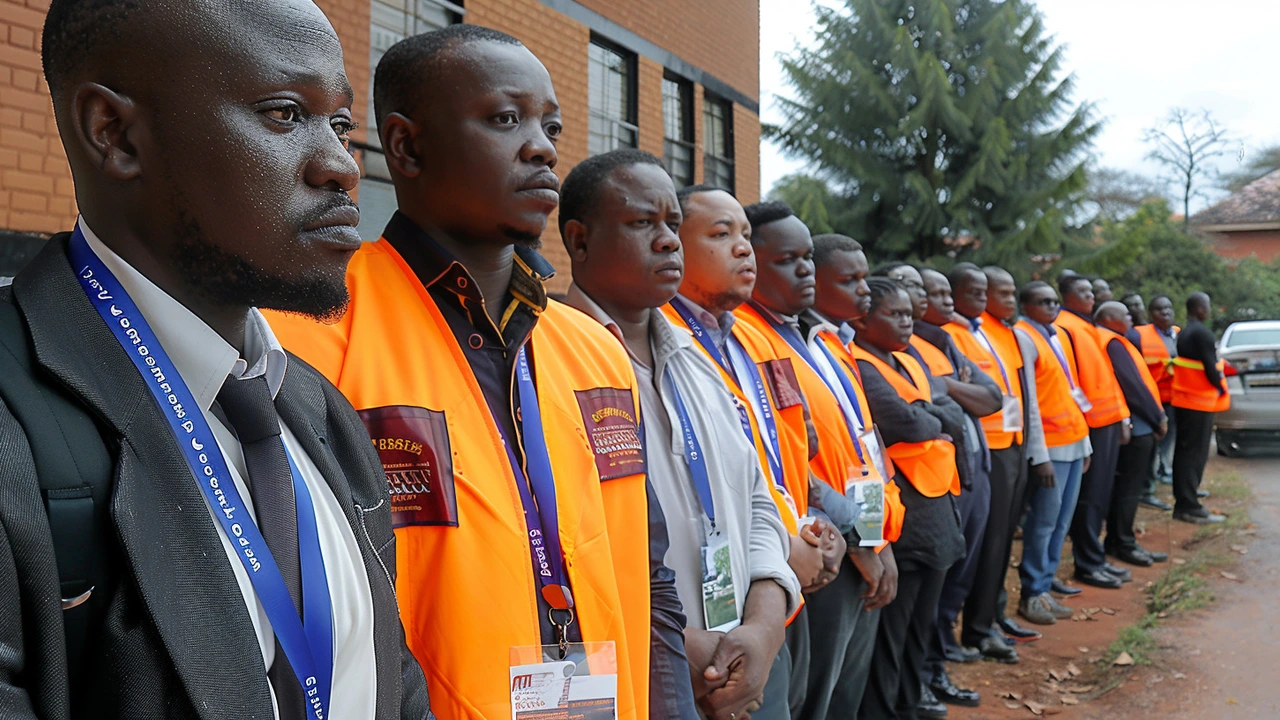Background and Context
The political landscape in Kenya experienced another dramatic twist as the Supreme Court upheld a decision that nullified the election of Harrison Garama, a member of the Orange Democratic Movement (ODM), as the Magarini Member of Parliament. This landmark ruling follows a protracted legal battle clinched by Stanley Kenga, a contestant from the United Democratic Alliance (UDA) party, who initially filed his grievances in High Court, escalating to the Court of Appeal and finally reaching the apex court.
The High Court's Initial Verdict
Stanley Kenga's legal odyssey began in the High Court, where he cited numerous irregularities that marred the election process. Among his claims were the allegations that his agents were denied access to polling stations, instances of vote padding, and blatant voter manipulation. These irregularities, he argued, violated the Constitution and compromised the integrity of the electoral process. The High Court, perusing the exhaustive evidence and testimonies, concurred and nullified Garama's election. However, this was merely the beginning of a legal saga that highlighted the flaws in Kenya's electoral system.
Court of Appeal's Endorsement
The Court of Appeal's affirmation of the High Court ruling added another layer of legitimacy to Kenga's claims. The appellate judges scrutinized the lower court's findings and concluded that the elections had indeed breached constitutional mandates. Despite Garama's robust defense, aimed at overturning the High Court’s verdict, the judgment stood firm. Kenga's legal triumph at this stage only fueled the anticipation for the final decision by the Supreme Court.
The Supreme Court's Landmark Decision
In a decisive turn, the Supreme Court of Kenya delivered its ruling, sealing Garama's fate. The five-judge bench meticulously reviewed the case, and their unanimous decision underscored the gravity of electoral integrity in democratic processes. Upholding the decisions of both the High Court and the Court of Appeal, the Supreme Court emphasized that any election conducted in contravention of the Constitution cannot be allowed to stand. This ruling not only vacated Garama’s position but also mandated the Independent Electoral and Boundaries Commission (IEBC) to declare the Magarini Constituency seat vacant and organize a by-election.

Implications for the ODM and Kenyan Politics
The Supreme Court's decision carries significant implications for both Garama and the Orange Democratic Movement (ODM). Firstly, it sets a judicial precedent that could influence future electoral disputes, reinforcing the notion that electoral malpractices will be subject to stringent legal scrutiny. For ODM, a party with considerable influence in Kenyan politics, this ruling serves as a warning and could prompt a reassessment of their electoral strategies and compliance with legal frameworks.
Financially, the burden on Garama extends beyond his loss of office. The Supreme Court also ordered him to pay Ksh2,000,000 in legal costs to Kenga, a substantial amount reflecting the extensive judicial journey. Additionally, despite the refund of Garama's Ksh6,000 security deposit, the financial and political ramifications of this ruling are substantial.
Future Electoral Processes and Reforms
This ruling also signals the need for comprehensive electoral reforms in Kenya. The issues raised by Kenga’s petition and validated through multiple court decisions highlight persistent vulnerabilities within the electoral system. The IEBC, responsible for overseeing elections, may need to implement stricter measures to ensure transparency and fairness in future polls. Enhanced training for electoral officers, improved logistical arrangements, and rigorous auditing mechanisms could be critical steps towards restoring public confidence in the electoral process.
Additionally, political parties across the spectrum might need to adopt more stringent internal controls to prevent any malpractices and prepare for more robust legal challenges in the future. Strengthening party mechanisms to ensure compliance with constitutional mandates and electoral laws can mitigate risks and foster a healthier democratic environment.

Kenga's Victory and Broader Consequences
For Stanley Kenga and the UDA, this ruling is a landmark victory with broader political consequences. It not only affirms Kenga’s unwavering commitment to electoral justice but also enhances the UDA’s standing in Kenyan politics. By championing the principles of electoral integrity, Kenga and his party have positioned themselves as advocates for democratic values, potentially influencing future electoral dynamics.
The verdict also encourages other candidates and parties to pursue legal recourse in instances of electoral grievances, shaping a political culture where adherence to the Constitution is paramount. This evolution could gradually fortify Kenya’s democratic institutions and ensure a more level playing field for all political actors.
Moving Forward: By-election Dynamics
As the IEBC prepares for the by-election in the Magarini Constituency, the political landscape is poised for intense competition. For ODM, selecting a new candidate who can resonate with the electorate and reclaim the seat will be crucial. On the other hand, the UDA will likely capitalize on this judicial victory, bolstering their campaign efforts to secure a win.
The forthcoming by-election not only offers a litmus test for the affected political parties but also provides a renewed opportunity for the electorate to exercise their democratic rights. Ensuring a transparent, free, and fair electoral process will be essential in restoring voter confidence and setting a positive precedent for future polls.

Concluding Reflections
The Supreme Court's decision to uphold the nullification of Harrison Garama's election underscores the importance of electoral integrity in Kenya’s democracy. This ruling reverberates beyond the Magarini Constituency, signaling a firm stance against electoral malpractices. As political actors digest and respond to this decision, it remains imperative for all stakeholders to champion the principles of fairness, transparency, and respect for constitutional mandates.
Ultimately, the path towards a fortified democratic environment in Kenya is forged through unwavering commitment to the rule of law and a collective resolve to uphold the fundamental tenets of electoral integrity.


Alex Lee
Garama totally screwed up the vote.
Vida Yamini
The Supreme Court decision is a clear reminder that electoral integrity matters.
It shows that the law can step in when the process is tainted.
Voters deserve a system that respects their voice.
Parties should take this moment to look at their internal processes.
ODM needs to reflect on candidate vetting and campaign conduct.
The UDA victory sends a signal that no party is above scrutiny.
By‑elections are an opportunity for fresh ideas and renewed trust.
Civil society groups can use this case to push for more transparent polling stations.
Training for poll officials must become a priority.
Audits should happen after each election to catch irregularities early.
The media can help by reporting any suspicious activity promptly.
The judiciary has shown that persistence in legal channels can yield results.
Candidates who feel cheated now have a precedent to follow.
The costs imposed on Garama also serve as a deterrent against malpractice.
Voter education programs can empower citizens to notice and report tampering.
Ultimately, the health of Kenyan democracy depends on collective vigilance.
James Lawyer
The court’s reasoning underscores the constitutional breach that occurred during the polling process. It carefully examined the evidence of denied access and vote padding, concluding that such violations cannot be tolerated. By upholding the lower courts’ rulings, the Supreme Court reinforced the principle that no candidate is above the law. This decision also clarifies procedural standards for future disputes, offering a clear legal framework. Moreover, the judgment sends a strong message to electoral bodies about the necessity of strict compliance with constitutional mandates.
Abby Culbertson
i cant belive this happen.
its so sad for the voters.
Awolumate Muhammed Abayomi
yeah i feel u! this shows why we need to keep pushing for fair polls!!!
let's keep the energy high and make sure every vote counts next time.
Josh Tate
That must be a heavy feeling for everyone involved. It's important we listen to the concerns of the community and keep supporting reforms that protect the vote.
John Smith
Everyone needs to understand that the legal costs are not just a punishment but a deterrent. Garama’s Ksh2 million fine is a clear indicator that the system will hold people accountable when they break the rules. This is a textbook case of why transparency and adherence to the electoral code are non‑negotiable.
Alex Soete
Totally agree with you! The fine sends a strong signal and it’s a good reminder for all parties to keep their campaigns clean. Let’s keep the conversation going and support any steps that improve the process.
Cara McKinzie
What a circus! This whole saga is just drama on top of drama.
Joseph Conlon
While some may enjoy the spectacle, the reality is far more serious than mere drama. The legal battle exposes systemic flaws that cannot be ignored. It is not entertainment; it is a warning that the electorate must demand stronger safeguards. The repeated court interventions highlight a troubling pattern of irregularities that erodes public trust. Therefore, the focus should shift from sensational headlines to concrete reforms that ensure every ballot is counted fairly.
Mohit Singh
Honestly, the whole thing shows how the system can be both weak and strong at the same time.
Damian Liszkiewicz
Reflecting on this decision reminds us that democracy is a living conversation 🌍🗳️. Each legal precedent adds a new stanza to the song of governance, urging us to listen, learn, and act with wisdom. Let’s keep nurturing that spirit of collective responsibility 😊.